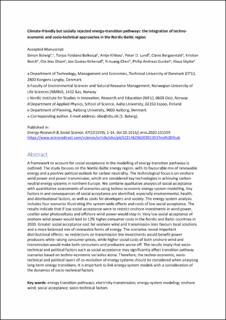Climate-friendly but socially rejected energy-transition pathways: The integration of techno-economic and socio-technical approaches in the Nordic-Baltic region
Bolwig, Simon; Bolkesjø, Torjus Folsland; Klitkou, Antje; Lund, Peter D.; Bergaentzlé, Claire; Borch, Kristian; Olsen, Ole Jess; Kirkerud, Jon Gustav; Chen, Yi-Kuang; Gunkel, Philip Andreas; Skytte, Klaus
Peer reviewed, Journal article
Accepted version

Åpne
Permanent lenke
https://hdl.handle.net/11250/2674417Utgivelsesdato
2020Metadata
Vis full innførselSamlinger
Originalversjon
Bolwig, S., Bolkesjø, T. F., Klitkou, A., Lund, P. D., Bergaentzlé, C., Borch, K., Olsen, O. J., Kirkerud, J. G., Chen, Y.-K., Gunkel, P. A. & Skytte, K. (2020). Climate-friendly but socially rejected energy-transition pathways: The integration of techno-economic and socio-technical approaches in the Nordic-Baltic region. Energy Research & Social Science, 67, 101559. 10.1016/j.erss.2020.101559Sammendrag
A framework to account for social acceptance in the modelling of energy-transition pathways is outlined. The geographical focus is on the Nordic-Baltic energy region and the technological focus is on onshore wind power and power transmission, which are considered key technologies in achieving carbon-neutral energy systems in northern Europe. We combine qualitative analysis of social acceptance with quantitative assessments of scenarios using techno-economic energy-system modelling. Key factors in and consequences of social acceptance are identified, especially environmental, health, and distributional factors, as well as costs for developers and society. The energy system analysis includes four scenarios illustrating the system effects and costs of low social acceptance. The results indicate that if low social acceptance were to restrict investments in onshore wind power, costlier solar photovoltaics and offshore wind power would step in. Greater social acceptance cost for onshore wind and transmission lines favours local solutions and a more balanced renewable energy mix. There are important distributional effects: no restrictions on transmission line investments benefit power producers while raising consumer prices in the Nordic-Baltic energy region, while very low social acceptance of onshore wind power would lead to 12% higher consumer costs. The results imply that socio-technical and political factors such as social acceptance may significantly affect transition pathway scenarios based on techno-economic variables alone. Therefore, the techno-economic, socio-technical and political layers of co-evolution of energy systems should be considered when analysing long-term energy transitions. It is important to link energy-system models with a consideration of the dynamics of socio-technical factors.
Utgiver
ElsevierTidsskrift
Energy Research & Social ScienceBeslektede innførsler
Viser innførsler beslektet ved tittel, forfatter og emneord.
-
Review of modelling energy transitions pathways with application to energy system flexibility
Bolwig, Simon; Bazbauers, Gatis; Klitkou, Antje; Lund, Peter D.; Blumberga, Andra; Gravelsinš, Armands; Blumberga, Dagnija (Journal article; Peer reviewed, 2018)The aim of this review is to discuss how quantitative modelling of energy scenarios for sustainable energy transition pathways can be made more realistic by taking into account insights from the socio-technical and related ... -
Innovations in fuel cells and related hydrogen technology in Norway – OECD Case Study in the Energy Sector
Godø, Helge; Nerdrum, Lars; Rapmund, Antje; Nygaard, Stian (NIFU skriftserie;2003-35, Research report, 2003-12)This report presents the results of an analysis undertaken by NIFU on innovations in fuel cells and related hydrogen technology in Norway. This country study is part of a larger effort jointly organized by the OECD’s Working ... -
Social science research on energy: International and Norwegian studies
Klitkou, Antje; Pedersen, Trond Einar; Schwach, Vera; Scordato, Lisa (NIFU STEP rapport;4-2010, Research report, 2010-02-19)This analysis indicates that energy, and environmental friendly energy especially, has increased in importance within social science publishing and also in terms of Norwegian participation in national and international ...